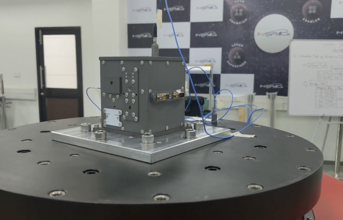
TakeMe2Space, a Hyderabad-based space technology firm, has announced the upcoming launch of MOI-TD (My Orbital Infrastructure—Technology Demonstrator), India's first AI laboratory in space. Scheduled for mid-December 2024, the mission will be launched aboard ISRO's PSLV C60 and aims to revolutionise space research by demonstrating real-time data processing in orbit, making it more affordable and accessible.
All testing and evaluation of the MOI-TD platform were facilitated by the IN-SPACe Technical Centre. IN-SPACe, the government's single-window agency for private sector space activities, has been instrumental in accelerating the platform's development. Located in Ahmedabad, the IN-SPACe Technical Centre provides state-of-the-art facilities for satellite testing and validation. TakeMe2Space plans to continue leveraging these resources for future missions, building on this successful collaboration.
The MOI-TD platform addresses a key challenge in satellite operations: satellites capture petabytes of data daily, with up to 40 per cent potentially unusable due to issues such as cloud cover. Transmitting all this data to Earth for processing—a process that can take weeks—is both costly and inefficient. By enabling data processing directly in orbit, MOI-TD provides actionable insights, drastically reducing data transmission costs and latency.
"MOI-TD will demonstrate how the space industry, particularly Earth observation, can be opened up to millions of space enthusiasts, researchers, and small businesses," said Ronak Kumar Samantray, founder and CEO of TakeMe2Space. "The space sector has long been accessible to only a select few. This needs to change to unlock the true potential of human creativity in space exploration and research."
Users will access the satellite platform through OrbitLab, a web-based console that allows them to upload AI models for applications such as environmental monitoring, deforestation tracking, maritime activity observation, greenhouse gas emission detection, and custom Earth observation use cases. The platform has already attracted its first research partners, including a leading Malaysian university and an ambitious group of Indian school students from years 9 and 10, showcasing its potential to democratise space research.
MOI-TD integrates advanced control software and hardware, including reaction wheels, magnetorquers, a state-of-the-art onboard computer, and an AI accelerator. It also features flexible solar cells capable of powering future satellites.
The mission represents a significant step towards the creation of data centres in space. While MOI-TD is focused on Earth observation applications, the underlying technology lays the groundwork for future space-based computing capabilities, comparable to today's cloud computing services. Although current costs are 10–15 times higher than terrestrial alternatives, space-based data centres promise future cost reductions and offer a more environmentally sustainable solution.
Earlier this year, the successful demonstration of the company's radiation shielding technology aboard PSLV C58 marked a critical advancement in extending satellite mission lifespans. Together with the accessibility of the MOI-TD platform, this development opens up unprecedented opportunities for space research.


























